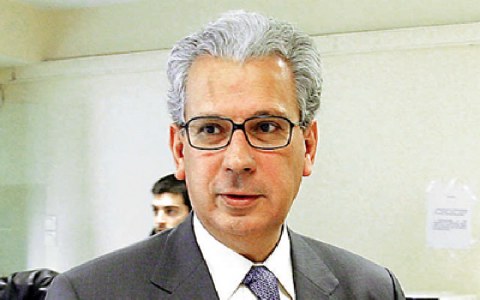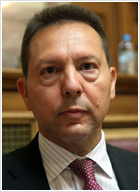Troika's representatives; Photo: Naftemporiki
 The head of the Council of Economic Experts Panos Tsakloglou was greeted very coldly by EuroWorking Group, causing concerns in the economic management of the government that the Troika will "break" the adjustment package political leaders drew up last Thursday.
The head of the Council of Economic Experts Panos Tsakloglou was greeted very coldly by EuroWorking Group, causing concerns in the economic management of the government that the Troika will "break" the adjustment package political leaders drew up last Thursday.
The government's anxiety is due to the Troika’s position concerning the effectiveness of the measures for saving the costs of structural reforms as well as of tax measures. The Ministry of Finance believes that the Troika will approve the cuts in pensions, salaries and bonuses to the amount of 7.6 billion euro and the increase in the retirement age to 67 years. It is optimistic about the tax package amounting to 3 billion euro. The Ministry, however, anticipates doubts concerning the fund for structural changes to the amount of 2.9 billion euro, including reductions of the costs of health care, education, defence, administrative reforms and more. The specific fund totalled 4.9 billion at first but the supervisors considered it unrealistic, because it did not involve tangible measures, and obliged the government to reduce it to 2.9 billion euro.
The government is concerned that the Troika might challenge the option of reducing the costs by 2.9 billion euro and might oblige it to include in the package also measures such as the exclusion of agriculture pensions and the cancellation of benefits for holidays and leaves. Moreover, the government is worried about the Troika’s final proposal for the reserve. Under the adjustment package, 15,000 employees should be in the reserve in 2013 (instead of in 2012 as stipulated in the February agreement), but the scheme of their payment has not yet been clarified. It is believed that the leaves from the public sector will increase due to the increase in the retirement age.
 The EuroWorking Group expressed yesterday in Brussels its strong doubts about the measures to the amount of 3 billion euro, which are part of the package of 13.5 billion euro, and the result from the implementation of structural reforms presented to European counterparts by the chairman of the Council of Economic Experts Panos Tsaklogolu. Paul Thomsen, the representative of the International Monetary Fund (IMF), had expressed these doubts for the first time during the meetings of the Minister of Finance Yiannis Stournaras with the representatives of the Troika in Athens.
The EuroWorking Group expressed yesterday in Brussels its strong doubts about the measures to the amount of 3 billion euro, which are part of the package of 13.5 billion euro, and the result from the implementation of structural reforms presented to European counterparts by the chairman of the Council of Economic Experts Panos Tsaklogolu. Paul Thomsen, the representative of the International Monetary Fund (IMF), had expressed these doubts for the first time during the meetings of the Minister of Finance Yiannis Stournaras with the representatives of the Troika in Athens.
This happened again yesterday, during the second day of the presentation of the measures of the programme in Brussels by P. Tsakloglou. Paul Thomsen once again disagreed with the representative of Greece. The same opinion was shared by some representatives of the council of experts-technocrats of the 16 members of Eurogroup, who had some differences among themselves too. The Dutch representative requested a change in the general amendments relating to the administrative reform. These measures include cuts in the costs of health (1.5 billion euro), defence (510 million euro), education (377 million euro) and savings from the administrative reform to the amount of 1 billion euro. As for the complicated scheme of the reserve, the International Monetary Fund stressed the absolute inefficiency demonstrated by the Greek state in the implementation of such measures in the past and required the cuts of 15,000 people, as agreed in the Memorandum.
The position of the representative of the European Union Matthias Morse was more compromising. As for the health care sector, the Troika insists on the merger of hospitals and it is not satisfied with the implementation of electronic prescribing to reduce pharmaceutical costs. On the other hand, Thomsen and Morse were willing to hear the statements of the Greek state about the amount of more than 350 million euro saved in education for 2013-2014, the merger of universities and the closure of higher vocational schools, some of which will be merged with universities. They were much more exacting on the method of reduction of the number of schools, requiring closure rather than merger of universities.
All this happened two days before the Troika returns to Athens, when the last part of the 2013-1014 negotiations is expected to take place and it is alarming that the Troika might reject entire categories of structural cuts.
According to representatives of the Troika, the purpose of setting the amount of 13.5 billion euro for the package of measures is to reach 11.5 billion euro, as agreed in February 2011, and this amount should come from cuts in spending rather than from revenue increases. It has become clear during the negotiations with the Greek government that the measures proposed to reduce the costs are not reliable and will not lead to certain success. Greece has suggested replacing some of the cost savings with increased revenues from taxes. Reiterating that it was an initiative of the Greek government, the Troika accepted it in order to avoid driving the negotiations to a deadlock. It has been emphasized that the purpose of the Troika is to achieve the target of 11.5 billion euro (5.5% of GDP) and that the amount of 13.5 billion euro was suggested by the Greek side. That is, if 11.5 billion euro are saved in the next two years, the Troika will be satisfied, and the remaining 2 billion euro are a "security zone." At the same time, the Ministry of Finance is planning to increase the tax burden on small and medium-income workers and pensioners, who are the majority of taxpayers, in order to ensure the adoption of the tax package of 3 billion euro.